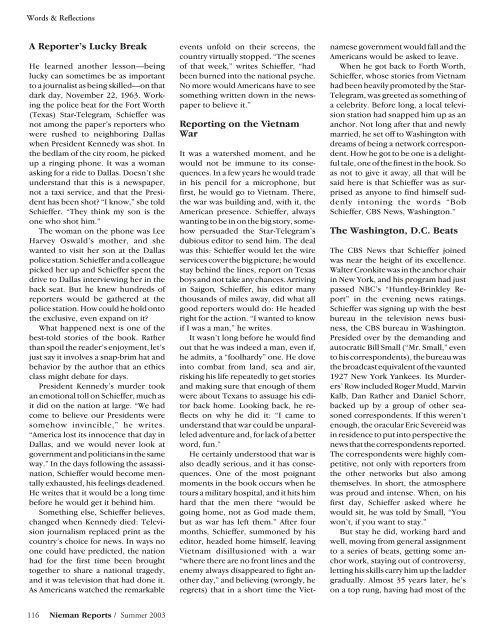summer-2003-Part 2-live - Nieman Foundation - Harvard University
summer-2003-Part 2-live - Nieman Foundation - Harvard University
summer-2003-Part 2-live - Nieman Foundation - Harvard University
- No tags were found...
You also want an ePaper? Increase the reach of your titles
YUMPU automatically turns print PDFs into web optimized ePapers that Google loves.
Words & ReflectionsA Reporter’s Lucky BreakHe learned another lesson—beinglucky can sometimes be as importantto a journalist as being skilled—on thatdark day, November 22, 1963. Workingthe police beat for the Fort Worth(Texas) Star-Telegram, Schieffer wasnot among the paper’s reporters whowere rushed to neighboring Dallaswhen President Kennedy was shot. Inthe bedlam of the city room, he pickedup a ringing phone. It was a womanasking for a ride to Dallas. Doesn’t sheunderstand that this is a newspaper,not a taxi service, and that the Presidenthas been shot? “I know,” she toldSchieffer. “They think my son is theone who shot him.”The woman on the phone was LeeHarvey Oswald’s mother, and shewanted to visit her son at the Dallaspolice station. Schieffer and a colleaguepicked her up and Schieffer spent thedrive to Dallas interviewing her in theback seat. But he knew hundreds ofreporters would be gathered at thepolice station. How could he hold ontothe exclusive, even expand on it?What happened next is one of thebest-told stories of the book. Ratherthan spoil the reader’s enjoyment, let’sjust say it involves a snap-brim hat andbehavior by the author that an ethicsclass might debate for days.President Kennedy’s murder tookan emotional toll on Schieffer, much asit did on the nation at large. “We hadcome to believe our Presidents weresomehow invincible,” he writes.“America lost its innocence that day inDallas, and we would never look atgovernment and politicians in the sameway.” In the days following the assassination,Schieffer would become mentallyexhausted, his feelings deadened.He writes that it would be a long timebefore he would get it behind him.Something else, Schieffer believes,changed when Kennedy died: Televisionjournalism replaced print as thecountry’s choice for news. In ways noone could have predicted, the nationhad for the first time been broughttogether to share a national tragedy,and it was television that had done it.As Americans watched the remarkableevents unfold on their screens, thecountry virtually stopped. “The scenesof that week,” writes Schieffer, “hadbeen burned into the national psyche.No more would Americans have to seesomething written down in the newspaperto believe it.”Reporting on the VietnamWarIt was a watershed moment, and hewould not be immune to its consequences.In a few years he would tradein his pencil for a microphone, butfirst, he would go to Vietnam. There,the war was building and, with it, theAmerican presence. Schieffer, alwayswanting to be in on the big story, somehowpersuaded the Star-Telegram’sdubious editor to send him. The dealwas this: Schieffer would let the wireservices cover the big picture; he wouldstay behind the lines, report on Texasboys and not take any chances. Arrivingin Saigon, Schieffer, his editor manythousands of miles away, did what allgood reporters would do: He headedright for the action. “I wanted to knowif I was a man,” he writes.It wasn’t long before he would findout that he was indeed a man, even if,he admits, a “foolhardy” one. He doveinto combat from land, sea and air,risking his life repeatedly to get storiesand making sure that enough of themwere about Texans to assuage his editorback home. Looking back, he reflectson why he did it: “I came tounderstand that war could be unparalleledadventure and, for lack of a betterword, fun.”He certainly understood that war isalso deadly serious, and it has consequences.One of the most poignantmoments in the book occurs when hetours a military hospital, and it hits himhard that the men there “would begoing home, not as God made them,but as war has left them.” After fourmonths, Schieffer, summoned by hiseditor, headed home himself, leavingVietnam disillusioned with a war“where there are no front lines and theenemy always disappeared to fight anotherday,” and believing (wrongly, heregrets) that in a short time the Vietnamesegovernment would fall and theAmericans would be asked to leave.When he got back to Forth Worth,Schieffer, whose stories from Vietnamhad been heavily promoted by the Star-Telegram, was greeted as something ofa celebrity. Before long, a local televisionstation had snapped him up as ananchor. Not long after that and newlymarried, he set off to Washington withdreams of being a network correspondent.How he got to be one is a delightfultale, one of the finest in the book. Soas not to give it away, all that will besaid here is that Schieffer was as surprisedas anyone to find himself suddenlyintoning the words “BobSchieffer, CBS News, Washington.”The Washington, D.C. BeatsThe CBS News that Schieffer joinedwas near the height of its excellence.Walter Cronkite was in the anchor chairin New York, and his program had justpassed NBC’s “Huntley-Brinkley Report”in the evening news ratings.Schieffer was signing up with the bestbureau in the television news business,the CBS bureau in Washington.Presided over by the demanding andautocratic Bill Small (“Mr. Small,” evento his correspondents), the bureau wasthe broadcast equivalent of the vaunted1927 New York Yankees. Its Murderers’Row included Roger Mudd, MarvinKalb, Dan Rather and Daniel Schorr,backed up by a group of other seasonedcorrespondents. If this weren’tenough, the oracular Eric Severeid wasin residence to put into perspective thenews that the correspondents reported.The correspondents were highly competitive,not only with reporters fromthe other networks but also amongthemselves. In short, the atmospherewas proud and intense. When, on hisfirst day, Schieffer asked where hewould sit, he was told by Small, “Youwon’t, if you want to stay.”But stay he did, working hard andwell, moving from general assignmentto a series of beats, getting some anchorwork, staying out of controversy,letting his skills carry him up the laddergradually. Almost 35 years later, he’son a top rung, having had most of the116 <strong>Nieman</strong> Reports / Summer <strong>2003</strong>
















